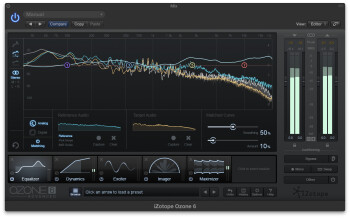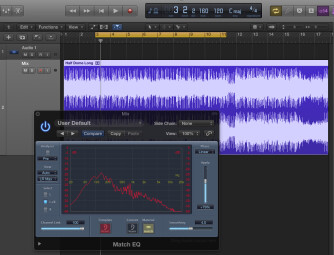A Match EQ is a specialized type of equalizer plug-in that works by extracting the EQ profile from one audio file and applying it to another, so that the latter sounds more like the former. This type of EQ can be used both in corrective and creative ways, as you’ll see if you read on.
Match me, please
Match EQs are not all that common. Apple Logic Pro X (and earlier versions) comes with one, axisplugins makes Match EQ, and the TC Konnekt system has a plug-in called Assimilator. The Nugen Audio SEQ-S, and FabFilter Pro Q 2 have match EQ features, A couple of iZotope applications Ozone 6 and Ozone 6 Advanced, and RX 4 and RX 4 Advanced also feature them. There are probably others, but those are the only ones I could find. I personally have experience with the Logic Pro, Ozone and RX match EQs.
Although the controls of different products can vary somewhat, the basic way you use a match EQ is as follows. First, you open it up on the source file, that is the audio that you want to match. There’s typically a “Learn” button, which samples the EQ profile of the source) usually a second one to learn the target audio’s unprocessed profile. With both profiles captured, the EQ can calculate how to make the target’s EQ curve match that of the source.
On some match EQ’s you’ll find a color-coded spectrum analyzer display simultaneously showing the source and target EQ curves, and on some, the match curve, as well. Usually there’s a slider that lets you choose what percentage of the source profile you want to apply on the target, and on some EQs, such as the one on Ozone 6 (which is part of its regular EQ module). The next step is usually to set the parameters and then hit the Match or Process button that initiates the actual matching. You can then experiment with the settings until you get what you want. Many match EQs have a “smoothing” feature, which smoothes out the EQ curve used for the match, sometimes helping the matched file blend in better with the source.
On the corrective side of things, a match EQ comes in handy when you have to two pieces of audio that need to sound like they were recorded on the same mic, but actually weren’t. Or an acoustic guitar part where on one of the overdubs, the player accidentally moved a little from the original mic position, and now you’re mixing and there’s a sonic discrepancy.
A match EQ is not going to perform miracles, because it’s dealing with the EQ profile of the sound, not its basic sonic character. It’s not going to make a tuba sound like a banjo, but it might make recordings of two different banjo’s sound like the same one. When you have a small but obvious difference between sounds, it can save your butt. Match EQs are also very useful for video work, because you can use them to more closely match voices recorded through camera mics with that of voices added in post production.
|
Like other match EQs, Logic Pro X's version can learn the EQ profile of an entire mix and copy it onto another
|
Some match EQ’s such as the one in Logic Pro or Nugen Audio’s SEQ-S, let you invert the matching curve, which can be useful when trying to carve out space in a mix. Here’s how that works: Say you’re mixing and the electric rhythm guitar part is getting in the way of the piano part. You’d use the match EQ to learn the profile of the piano, and then you’d invert the profile and apply some percentage of it to the rhythm guitar. By doing that, it will be reducing the frequencies of the guitar that are in the same range as the piano, making both fit together better.
Matching with the stars
The really fun part of a match EQ however, is to use it as a creative tool. One of the coolest ways to do that is to find a song from a CD that’s similar to yours in style and instrumentation, with an overall sound to it that you like (better a CD than an MP3, or other compressed format, for the sake of fidelity). Use the matching EQ to learn its EQ profile, and then apply that to your mix. You’ll be surprised how much of an improvement, or at least a change, you can make by doing that. You could also take the EQ profile of a wholly different type of song and apply it, which might give you interesting results, or might sound really bad. There’s room for experimentation.
Perfect match
As you can see, a match EQ is a unique processor that can be quite useful. Depending on the EQ, it can take a while to learn how to use it to its fullest potential, so be patient with it. Make sure to read the manual so you know what each control is for, and how it impacts the eventual result. Happy matching!
Watch this video for examples of a match EQ in action


